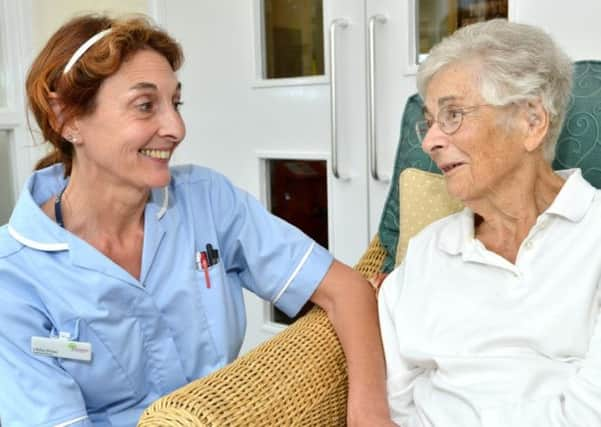‘More needs to be done to care for the dying’


The hospices were responding to a survey by the Royal College of Nursing (RCN) showed that nine in 10 nurses feel unable to care properly for dying patients.
The survey – published on Monday – also pointed out that many staff are ‘profoundly troubled’ by an inability to give good end-of-life care.
Advertisement
Hide AdAdvertisement
Hide AdThey felt they had too little time and in many cases lacked the training to do so, the survey showed.
Berkhamsted’s Hospice of St Francis and Watford’s Peace Hospice say end-of-life care should be available regardless of whether people die at home, in hospital or in a hospice.
The two organisations are now six months into a project of sharing best practice in the field with Watford General Hospital.
They are helping to equip busy nurses with the ability to hold important conversations with patients approaching the end of life and their families.
Advertisement
Hide AdAdvertisement
Hide AdThe hospices are also working individually with GPs and care homes to advise medical and care staff on the latest approaches to advance care planning.
Jo Fernandes has been a nurse for 23 years – 13 of them spent at The Hospice of St Francis.
She said: “It is a great privilege to care for patients at the end of their lives, which is why I and many of my colleagues cherish our roles.
“We are acutely aware of how our approach impacts patients and how the need to have a pain-free, peaceful death, is important for family members in whose memory an individual lives on.”
Advertisement
Hide AdAdvertisement
Hide AdClare Hearnshaw recently became director of care and clinical development at St Francis, having previously worked in a busy hospital.
She said: “I am conscious of the differences in care between hospices and hospitals.
“Nursing teams in both environments are dedicated to their patients, but in a hospital environment it is often difficult for nurses to spend quality time with individual patients due to time and staffing resource pressures.
“Hospices are focused on ensuring all their patients get the best care possible but also on investing in training so that nurses feel confident to hold difficult conversations with patients about all that concerns them.
Advertisement
Hide AdAdvertisement
Hide Ad“However, at present, we just don’t have the capability to reach all the 4,000 people who die in West Herts each year.
“Whilst more NHS investment in end of life care and better support and training for nurses is urgently required, part of our remit at The Hospice of St Francis is to expand our hospice’s influence and ensure we collaborate with clinicians in the local community to share our knowledge.
“My hope for the future is that with more resources and stronger partnerships, we will ensure that all patients with life-limiting illnesses in West Herts are able to access the same high standard of care at the end of life, whether that’s at home, in hospital or in a care home.”